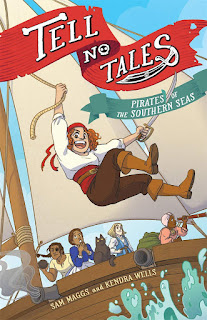Tell No Tales is the new YA graphic novel from Sam Maggs and Kendra Wells, telling a hitherto untold story of Anne Bonny and her crew against the pirate hunter Woodes Rogers. The "hiterto untold" part means that, while we're dealing with actual historical figures, the story itself is largely invented.
Bonny's crew consists of four other women, each with distinct talents and abilities. And they're occasionally assisted by Bonny's ex-boyfriend, Calico Jack. (For the record, Bonny was bisexual. She's actively dating Mary Read in this story.) On an early encounter with a Spanish Galleon, they're attacked by Rogers in a steal, steam-powered monster of a ship that easily shakes off all their counter attacks. They're forced to flee and, as they recover, Bonny has a dream on how to defeat Rogers. Like any real dream, though, it's a bit vague, but she does realize that she needs something for and from each member of her crew. So they track down some items related to each of their pasts, and use them to tackle Rogers. While they collectively win, Bonny and Read are catured and imprisoned, but just as Bonny asks Read about their escape plan, an older Bonny cuts off the tale she's been telling a room full of her grandchildren. But she does promise more tales of "the spectacular sirens of the seven seas!"
Overall, it's a fun story. Distinctive and interesting characters. It doesn't pretend to be a true story, and Maggs includes an afterword that relays a bit more historical information about both the real characters and the inspirations for the fictional ones. She has a line in there that I quite like and think sums up her approach well: "Even though we know so much about Anne Bonny, Mary Read, and the people they may have interacted with during their time at sea, I always felt like we didn't know enough." [Emphasis in the original.] I think that's a great approach to this type of story. I get annoyed when biographers (in comics and other media) invent connections and circumstances that weren't there, and pass it off as even mildly factual. If you're going to do a biography, be clear on what's known, what's speculation, and what's invented for narrative purposes. I can sometimes also get annoyed when creators borrow a historical figure's name, but then just use it as a selling point and go off in some weird tangent that doesn't jive with anything we know about the person. Thomas Edison as a secret society villain that creates steampunk robots using other people's creations? Sure. Albert Eistein as a gun-toting James Bond style secret agent? Not so much.
The approach here makes a lot more sense to me. It's basically historical fiction, but it's much more upfront about being loose with the "historical" aspect of things. I mean, if you somehow can't figure it out any earlier, Rogers' steampunk battleship is a CLEAR dead giveaway. Setting that expectation up early means I can relax and just enjoy the story without trying to mentally fact-check it against what I know and/or trying to suss when this is supposed take place in Bonny's actual timeline.
Fun in comics! Who knew?
Tell No Tales came out just last month, so it should still be easy to find in bookstores, comic shops, and digitally. The paperback retails for $12.99 US.
Now Available!
Blog Archive
-
▼
2021
(290)
-
▼
March
(26)
- What's Going on with Andy?
- What the Font Review
- Alice, Secret Agent of Wonderland Review
- Weekly Recap
- Upcoming Comics Calendar
- How Much Research Is Too Much?
- Robert Zuppke, Cartoonist?
- Punk Seth?
- The Original Infinity War
- Weekly Recap
- I Love the Smell of Old Comics in the Morning
- The Most Iconic -- but WRONG! -- FF Image
- Build an Army of 3D-Printed Supermen!
- The Origin of the Annual
- What Was Intended for FF #51?
- Weekly Recap
- Draw 50 Famous Cartoons As an Old Strip Primer
- Petty's Runnin' Down a Dream
- Buster Brown
- Tell No Tales Review
- AI-Created Comics
- Weekly Recap
- Upcoming Comics Events
- Lost in Translation
- What Comic Strips Can Teach Webcomics
- From Doorman to Micro-Face
-
▼
March
(26)







0 comments:
Post a Comment